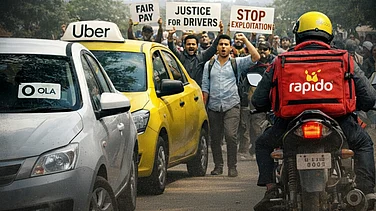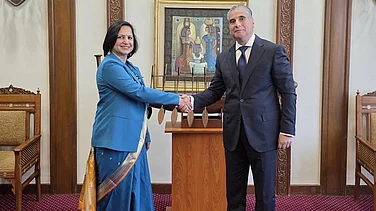State-owned oil marketing companies IOC, BPCL and HPCL may for the first time ever post the second consecutive quarterly loss with a combined loss of Rs 21,270 crore in July-September, on holding petrol and diesel prices below the cost of production.
The three state-owned firms -- Indian Oil Corporation (IOC), Bharat Petroleum Corporation Ltd (BPCL) and Hindustan Petroleum Corporation Ltd (HPCL), had in the first quarter of the current fiscal year (April-June) posted a combined loss of Rs 18,480 crore due to erosion in the marketing margin on petrol, diesel and domestic LPG.
"The three oil marketing companies IOC, BPCL and HPCL remain trapped in the quagmire of weak marketing losses and there is not enough traction in refining margins," ICICI Securities said in a sector report.
The three firms are to announce second quarter earnings later this month or in early November.
In the first quarter, record refining margins were wiped away by losses booked on not revising petrol and diesel prices daily in line with cost. While the difference between cost and retail selling price of petrol and diesel has narrowed, refining margins have fallen in the second quarter (July-September), worsening finances of the three firms.
The "Q2 may see the trend worsen, with USD 5.6-15.9 per barrel quarter-on-quarter dip in gross refining margins (GRMs) which is compensated only partly by improvement in blended retail fuel losses (Rs 9.8 per litre in in Q2 versus Rs 14.4 a litre in Q1)," the brokerage said.
Overall, the three oil marketing companies (OMCs) are set to report an EBITDA loss of Rs 14,700 crore and Rs 21,270 crore of net loss for the second quarter of FY23 (April 2022 to March 2023 fiscal), it said.
The three firms have not changed petrol and diesel prices for over six months now -- a record since daily pricing came into force in 2017, despite high crude oil prices and weak rupee pushing up cost of production.
They have also not changed cooking gas LPG rates in tandem with cost.
According to ICICI Securities, IOC, the nation's largest oil firm, is likely to post a net loss of Rs 6,300 crore, while BPCL may book Rs 6,900 crore loss. HPCL may post Rs 8,100 crore net loss.
This will be the first time when the three firms post two consecutive quarters of record net losses.
IOC had on July 29, reported a net loss of Rs 1,995.3 crore for the April-June quarter. HPCL reported its highest ever quarterly loss of Rs 10,196.94 crore and BPCL posted a loss of Rs 6,290.8 crore.
The combined loss at Rs 18,480.27 crore in Q1 was the highest ever for any quarter including the era when petrol and diesel prices were regulated and the government used to give subsidies to the three retailers.
The three firms did not revise petrol and diesel prices in line with rising costs to help the government contain inflation which had topped 7 per cent.
While the government has maintained that oil companies are free to revise retail prices, the three state-owned firms haven't explained the reasons for freezing the rates since April 6.
Typically, oil companies calculate a refinery gate price based on import parity rates. But if the marketing division sells it at prices less than import parity, losses are booked.
State fuel retailers are supposed to align rates with an international cost every day. But they have periodically frozen prices before crucial elections.
IOC, BPCL and HPCL stopped revising rates ahead of assembly elections in states like Uttar Pradesh last year. That 137-day freeze ended in late March with prices being raised by Rs 10 per litre each before another round of freeze came in force in early April.
This is despite international oil prices soaring to multi-year high on supply concerns following Russia's invasion of Ukraine.
The government in May cut excise duty on petrol and diesel which was passed on to consumers instead of being used to square off mounting losses on the two fuel sales.
The current freeze on petrol and diesel prices, excluding the reduction due to a cut in excise duty, is now 186 days old.

IOC, HPCL, BPCL May Post 2nd Consecutive Quarterly Loss In July-September
IOC, HPCL, BPCL May Post 2nd Consecutive Quarterly Loss In July-September
Published At:
- Previous Story
 Uber, Ola, Rapido Drivers to Go on Nationwide Strike on Feb 7: What Are Their Key Demands
Uber, Ola, Rapido Drivers to Go on Nationwide Strike on Feb 7: What Are Their Key Demands - Next Story
MOST POPULAR
WATCH
MORE FROM THE AUTHOR
×


















.jpg?w=200&auto=format%2Ccompress&fit=max)




